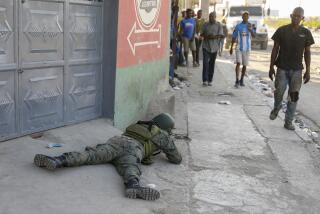Administration Plans to Seek Broader Haiti Sanctions : Caribbean: ‘Selective’ embargo has failed to induce military to talk. Christopher says only other option is troops.
- Share via
WASHINGTON — The Clinton Administration plans to seek a major escalation in U.N. economic sanctions against Haiti this week after the collapse of U.N.-sponsored negotiations with the Caribbean nation’s military regime, officials said Saturday.
In the wake of last week’s diplomatic fiasco, in which the Haitian military failed to show up at talks called by U.N. mediator Dante Caputo, the Administration is considering a shift from the current “selective” embargo--aimed at the military and its wealthy supporters--to a broader economic embargo that might have more impact, one official said.
“The military there is going to be under considerable pressure to do something--in other words, to go back to these accords,” Secretary of State Warren Christopher said, referring to an agreement signed in July by Haiti’s military leader.
Under the accords, the military agreed to return power to President Jean-Bertrand Aristide, who was elected in December, 1990, and overthrown in September, 1991.
Christopher, speaking in an interview with CNN, said the Administration believes increased economic pressure “is the only solution to that situation--unless we want to go in and occupy the island with . . . tens of thousands of American troops.”
Christopher added that he doubts sending troops “is something that’s the right solution for us.”
The current sanctions against Haiti, designed largely by the United States, focus only on military equipment and petroleum products--a tactic intended to affect the nation’s army and its upper crust, but not the majority of its impoverished citizens.
But the Administration’s selective sanctions failed to push Haiti’s military commander, Lt. Gen. Raoul Cedras, to the negotiating table last week. And Aristide and his supporters have renewed their calls for broader measures, even though those may cause suffering to Haiti’s poor.
As a result, the Administration is considering a list of possible sanctions that could include a complete trade embargo, a freeze on transfers of dollars to the nation and tighter controls on Haiti’s only land border, its eastern frontier with the Dominican Republic.
U.N. negotiator Caputo left Haiti on Saturday aboard a U.S. Air Force jet for Washington, where he is to report on the failure of his mission to the Organization of American States before proceeding to New York to report to U.N. Secretary General Boutros Boutros-Ghali.
Also aboard the plane was a special envoy from the Administration, Lawrence Pezzullo, who is expected to report to Christopher.
After hearing their reports, the United States will “begin consultations with the U.N. and the OAS about possible next steps,” State Department spokeswoman Julie Reside said.
The debate over sanctions centers on whether a complete trade embargo will cause more suffering for Haiti’s nearly 7 million people, most of whom live in abject poverty, than for the military officers and wealthy rightists who control its government.
Aristide and his supporters have increasingly argued that a total trade embargo is a better course because it has a better chance of producing results.
Even under limited sanctions, they said, Haiti’s poor are suffering the consequences of spiraling food prices and scarce fuel--along with the military’s reign of terror.
Humanitarian organizations have begun making the same argument. John Hammock, executive director of Oxfam America, said last week that selective sanctions had not succeeded in insulating the poor from deprivation and will take far longer to produce results than a total embargo.
More to Read
Sign up for Essential California
The most important California stories and recommendations in your inbox every morning.
You may occasionally receive promotional content from the Los Angeles Times.











